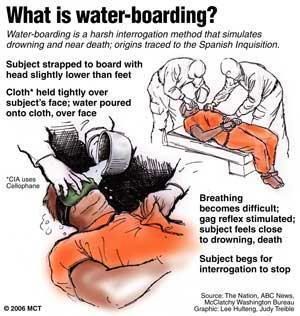
The Associated Press reports:
In an intense exchange Thursday with three Democrats, President Bush's nominee for attorney general left the door open for allowing a terrorism-era interrogation technique that simulates drowning.
Michael Mukasey, a retired federal judge, issued highly-conditioned statements that so-called waterboarding violates the Constitution only if it is defined as torture.
The answer is unclear.
In an executive order this summer, Bush allowed the use of some harsh interrogation techniques but his administration refused to say whether waterboarding was among them. Congress has banned waterboarding as part of a detainee treatment law.
During Thursday's proceedings, Senate Democratic Whip Dick Durbin probed for Mukasey's opinion.
"I'm hoping that you can at least look at this one technique and say: that clearly constitutes torture, it should not be the policy of the United States to engage in waterboarding," said the Illinois Democrat.
"It is not constitutional for the United States to engage in torture in any form, be it waterboarding or anything else," Mukasey replied.
Under subsequent questioning by Chairman Patrick Leahy, D-Vt., Mukasey said the practice of waterboarding, if defined as torture, can't be permitted by the president.
"If it is torture as defined by the Constitution, or defined by constitutional standards, it can't be authorized," Mukasey said.
Judiciary Committee members, most lawyers themselves, have little tolerance for parsing after earlier hearings in which then-Attorney General Alberto Gonzales on dozens of occasions either did not answer questions or blamed a faulty memory for not answering them.
"Is waterboarding constitutional?" pressed Sen. Sheldon Whitehouse, D-R.I. "It either is or it isn't."
Mukasey again demurred, saying he doesn't know what's involved in the technique.
"If it amounts to torture, it is not constitutional," the nominee replied.
"I'm very disappointed in that answer," Whitehouse said. "I think it's purely semantics."
The president himself has repeatedly said "We don't torture" and argued that intense interrogations are sometimes necessary to elicit information about terrorist plots.
The White House suggested Thursday that Mukasey's answers were vague because he does not know the specifics of the program.
"Judge Mukasey is not in a position to discuss interrogation techniques which are necessarily classified," said White House spokesman Tony Fratto. "He would only be read-in to classified programs after being confirmed."
So far, Mukasey has told senators he will reject any White House meddling in Justice Department matters and resign if his legal or ethical concerns about administration policy are ignored. He also said he's resistant to passing a law shielding reporters from being forced to reveal their sources, saying it would be much easier to fix internal Justice Department practice if need be.
Majority Democrats, aided by some Republicans, have urged passage of a media shield because they say it would protect reporters and government whistleblowers who reveal improper or illegal official activity. Fifty news outlets, including The Associated Press, support the legislation.
The Bush administration has issued a veto threat, saying that subpoenas for reporters are relatively rare and that a shield would make it harder to track down leakers of classified information.
Mukasey said that he has reservations about the legislation because it sets too high a legal threshold for prosecutors to meet to overcome the shield. Proving that the disclosure is needed to prevent an attack is difficult in advance, the nominee said Wednesday.
The measure also pending defines a journalist too broadly and might inadvertently protect, for example, bloggers who are also spies or terrorists, Mukasey said.
Thursday, October 18, 2007
Dems Ask Michael Mukasey, "Is It Torture?"
Posted by Maeven at 3:31 PM
Labels: Michael Mukasey, Senate Judiciary Committee, torture